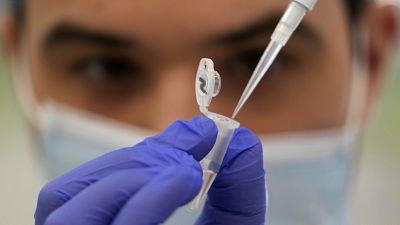The World Health Organization (WHO) this week hosted an event looking into how the healthcare industry is being shaped by digital technology.
The real threat of artificial intelligence (AI)'s increased role in healthcare is the "lack of regulation," according to the World Health Organization's European regional director.
"The train of artificial intelligence has left. So in that sense, we have to embrace it and have to have a positive approach," Dr Hans Kluge told Euronews Next on the sidelines of a WHO symposium on the future of health in a digital era.
"It has fantastic possibilities for developing new medicines, for example, also on screening," he added.
"But of course, the real threat is the lack of regulation of artificial intelligence. The basis of medicine is primum non nocere: first of all, do not harm. And that's the key for governments to do, to regulate without suffocating," Kluge told Euronews Next.
It was one of the big topics at the international agency's conference in Porto, Portugal this week, and is a "main message" for the European regional office's 53 member states, according to the regional director.
Speaking to Euronews Next, Kluge also discussed future health threats, preparations for a possible winter COVID-19 spread, and shortages of health workers in many European countries.
'Continued surveillance important'
While European countries are "better prepared" for future waves of COVID-19, Kluge said, several countries are "diminishing or stopping surveillance".
He added that it's very important to continue with wastewater surveillance, for instance, and to continue vaccinating against both COVID-19 and influenza.
According to the latest update from the European Centre for Disease Control and Prevention (ECDC), COVID transmission has increased in the last several weeks "from previously very low levels".
There have also been some concerns about new emerging subvariants of Omicron, such as EG.5 and BA.2.86.
Pharmaceutical companies Pfizer and Moderna have said their updated COVID-19 vaccines were effective against the new variants.
Meanwhile, two other big health threats, according to Kluge, include the war in Ukraine and climate change.
"It's very important that there is no fatigue by the mission to support the Ukrainian healthcare workers," he told Euronews Next.
The agency said back in May that there had been more than 1,000 attacks on Ukrainian healthcare since the beginning of the war in February 2022.
On the role climate change will play in health, Kluge said the threat is not in the future but rather "here and now".
'New way of organising healthcare'
Doctors in several European countries have raised concerns about having too many patients and working overtime. Portuguese doctors' unions even showed up at the WHO conference in Porto to raise their concerns about ongoing pay negotiations with the government.
Kluge said that doctors and nurses do not feel appreciated and that there is a "kind of malaise" after the pandemic.
He also pointed out that governments need to plan for the future as many doctors across the region reach retirement age.
"More than 40 per cent of our general practitioners are reaching or have reached retirement age. So we need to think of a new way of organising healthcare, for example, to move from solo practices of general practitioners to multi-disciplinary practices," he said.
He added that the administrative burden on doctors should be cut and that countries need to plan ahead to take into account "an ageing population on the continent".



